

nostalgiadigest.com
HERE'S THE BOOK OLD-TIME-RADIO FANS HAVE BEEN WAITING FOR!
Speaking of Radio
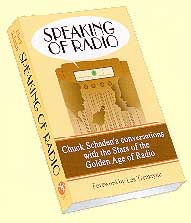
Chuck Schaden's conversations
with the
Stars of the
Golden Age of Radio
Foreword by Les Tremayne
Recollections of
the great radio days by the stars who made them great.
In their own words, 46 radio personalities take you back to the good old
days
for a behind-the-scenes look at the way it was
during the golden era
of broadcasting.
420 pages, 46 interviews and photos, 6x9 soft cover book with index,
$27. Purchase at our secure
Nostalgia Shop.
Don
Ameche • Eve Arden •
Bill Baldwin •
Jack Benny •
Edgar Bergen •
Jim Boles •
Ken Carpenter •
Norman Corwin •
Dennis Day •
Howard Duff •
Ralph Edwards •
Alice Faye •
Virginia Gregg •
Phil Harris •
Jim Jordan •
Jay Jostyn •
Howard Koch •
Elliott Lewis •
Phil Leslie •
Art Linkletter •
Barbara Luddy •
Mercedes McCambridge •
Agnes Moorehead •
Bret Morrison •
Carlton E. Morse •
David Nelson •
Frank Nelson •
Harriet Nelson •
Arch Oboler •
Harold Peary •
Ed Prentiss • Tony Randall •
Lillian Randolph •
Alan Reed •
Mary Lee Robb •
Ken Roberts •
Kate Smith •
Olan Soulé •
Ezra Stone •
Russell Thorson •
Les Tremayne •
Lurene Tuttle •
Rudy Vallee •
Harry Von Zell •
Willard Waterman •
Don Wilson
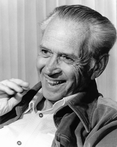
"In those days, you didn’t speak of it as a radio job, because radio didn’t pay anybody any money. All you did was go in and perform. You could walk in off the street, into any radio station, and they were glad to have you. If you had a ukulele under your arm, you could go to work. For nothing."
–JIM JORDAN (Fibber McGee)
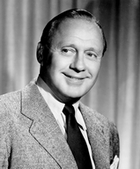 "The last year that I
was with General Foods... I had a few shows that weren’t as hot, but I
still had a lot of great shows. So they practically said to me, ‘Watch
it a little bit...’ as though every show had to be perfect, you know.
See, I spoiled them. And then they went back to New York. But the way they
said to me, ‘Just watch it a little bit,’ I got mad."
"The last year that I
was with General Foods... I had a few shows that weren’t as hot, but I
still had a lot of great shows. So they practically said to me, ‘Watch
it a little bit...’ as though every show had to be perfect, you know.
See, I spoiled them. And then they went back to New York. But the way they
said to me, ‘Just watch it a little bit,’ I got mad."
–JACK BENNY
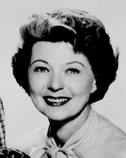 "I
loved radio best and I’ll tell you why. You could have a life of your own in
radio. It was big time. You did it live. You didn’t dare make a mistake... It
only happened once a week, so you could live like a human being the rest of the
week. I had more personal time when we were in radio. I still get such a kick
out of those radio shows."
"I
loved radio best and I’ll tell you why. You could have a life of your own in
radio. It was big time. You did it live. You didn’t dare make a mistake... It
only happened once a week, so you could live like a human being the rest of the
week. I had more personal time when we were in radio. I still get such a kick
out of those radio shows."
–HARRIET NELSON
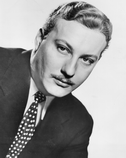
"I was called down to audition for something. They said, ‘Just read this.’ I read it and forgot about it. About a week or so later, I got a call that said, ‘Oh, you’re it.’ And so I did it from then until it went off the air. I did The Shadow, I guess, longer than anyone."
–BRET MORRISON (Lamont Cranston)
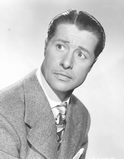 "The
Mae West episode? --I almost got thrown off the air for life because of that
skit."
"The
Mae West episode? --I almost got thrown off the air for life because of that
skit."
–DON AMECHE
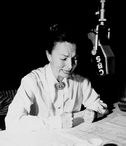 Sorry
Wrong Number "...was written for me
by Lucille Fletcher. It was so nerve-racking that I thought, ‘No one will
listen to this.’ The first time we went on the air, they got so excited at the
very end that they didn’t do the right ending. So in about five weeks I
repeated it. I did it 18 times on the air."
Sorry
Wrong Number "...was written for me
by Lucille Fletcher. It was so nerve-racking that I thought, ‘No one will
listen to this.’ The first time we went on the air, they got so excited at the
very end that they didn’t do the right ending. So in about five weeks I
repeated it. I did it 18 times on the air."
–AGNES MOOREHEAD
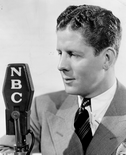 "I
did not only great things for the program, but also I think I probably saved
radio itself from going downhill almost into oblivion. The president of NBC said
to me, ‘Mr. Vallee, you have demonstrated how powerful radio can be. We are
deeply indebted to you. We feel that, in a way, you have saved the National
Broadcasting Company.’ "
"I
did not only great things for the program, but also I think I probably saved
radio itself from going downhill almost into oblivion. The president of NBC said
to me, ‘Mr. Vallee, you have demonstrated how powerful radio can be. We are
deeply indebted to you. We feel that, in a way, you have saved the National
Broadcasting Company.’ "
–RUDY VALLEE
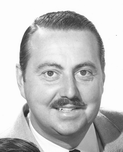 "We
used to take what we called a 12-hour vacation. You’d pick an evening when you
were through fairly early and didn’t have a show until perhaps noon the next
day, and you’d imbibe a little heavily and the next morning you were usually a
little hung over but, boy, were you relaxed!"
"We
used to take what we called a 12-hour vacation. You’d pick an evening when you
were through fairly early and didn’t have a show until perhaps noon the next
day, and you’d imbibe a little heavily and the next morning you were usually a
little hung over but, boy, were you relaxed!"
–WILLARD WATERMAN
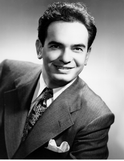 "In
one week I did 20 shows. I was doing the Harris show as an actor, I was
producing and directing Suspense, I was producing, directing, editing,
writing openings and closings, and co-starring in On Stage. I was
producing and directing Broadway’s My Beat and I was producing,
directing and writing the openings and closings and editing Crime Classics."
"In
one week I did 20 shows. I was doing the Harris show as an actor, I was
producing and directing Suspense, I was producing, directing, editing,
writing openings and closings, and co-starring in On Stage. I was
producing and directing Broadway’s My Beat and I was producing,
directing and writing the openings and closings and editing Crime Classics."
–ELLIOTT LEWIS
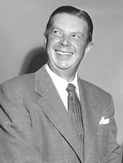 "I
remember the introduction for Eddy Duchin, ‘the inimitable piano fingers of
Eddy Duchin.’ Now, you wanted to say that one real fast, and as the announcer,
I did it for some time. You would just stand there and blood would pour down
your face. In an up-voice, too! That was a brute."
"I
remember the introduction for Eddy Duchin, ‘the inimitable piano fingers of
Eddy Duchin.’ Now, you wanted to say that one real fast, and as the announcer,
I did it for some time. You would just stand there and blood would pour down
your face. In an up-voice, too! That was a brute."
–KEN CARPENTER
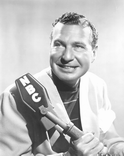 "Man,
you got a book there, I tell you!"
"Man,
you got a book there, I tell you!"
–PHIL HARRIS
Purchase your copy of Speaking of Radio at our secure Nostalgia Shop.
This article about
Speaking of Radio was published in the
Arts & Entertainment section of the Chicago Tribune October 26, 2003:
By Steve Darnall
When Chuck Schaden prepared to interview actress Agnes Moorehead in 1971, her handlers presented two directives. First, she was there to promote United General Theaters’ new "mini-theater" concept (we know them now as multiplexes) and he should stick to that subject. Second, he had five minutes.
As the host of the weekly nostalgia-fest "Those Were The Days" (now heard Saturdays from 1-5 p.m. on WDCB-FM 90.9), Schaden was willing to honor their first request, even though he was more interested in asking Moorehead about acting opposite Orson Welles on "The Shadow" or impersonating Eleanor Roosevelt on "The March of Time." As for the second request...
"I didn’t care if they dragged me out by my heels; I wasn’t going to do five minutes," Schaden recalls with a laugh from his Morton Grove home. "Then I started talking with Miss Moorehead about her radio work... and something happened. She realized that I wasn’t just some guy representing a three-minute sound bite for some radio station; I knew about her career on radio." After a few minutes, Moorehead’s handlers began moving in to wrap things up "and she put her hand out to stop them. It was a very gratifying conversation."
In the three decades since then, Schaden has spoken with dozens of actors, directors and writers who took part in that era known as the Golden Age of Radio. Some were big stars and required listening (including Jack Benny, Eve Arden and Don Ameche), while others were dependable character actors; a majority of them are no longer with us.
What Schaden learned about radio history from these conversations could fill a book, and with the publication of his interview anthology "Speaking of Radio" (Nostalgia Digest Press, 420 pages, $27; www.nostalgiadigest.com), it has.
"When I first went on the air, all I thought about was going on the air with the radio shows," Schaden recalls. "But that wore off for me quickly. It seemed natural for me to want to talk more about the programs and the performers and learn more from the performers. When I started doing this, there was no real written history of the popular culture of radio and its programs and performers. All of these interviews – each in its own way – helped fill me in on what was going on."
The 46 interviews in "Speaking of Radio" paint a fascinating picture of the birth and growth of America’s first real mass medium, before satellite communications and the ascension of shrill, opinionated hosts. In those days, as former announcer Harry Von Zell told Schaden in 1974, radio was "the most intimate and socially personal medium in the world."
As many of Schaden’s interviewees explain, radio also offered creative options that movies and television couldn’t. Actress Lurene Tuttle echoed the sentiments of many radio actors when she told Schaden, "On the air, I could be the most glamorous, gorgeous, tall, black-haired female you’ve ever heard in your life. Whatever I wished to be, I could be with my voice." (Tuttle later became a respected acting coach whose students included a young Helen Hunt.) In one 1976 interview, Mercedes McCambridge (who gave voice to the demon in "The Exorcist") recalled playing Tiny Tim opposite John and Lionel Barrymore in a Christmas Eve radio production of "A Christmas carol," despite being so pregnant that she would give birth to her son four hours later.
Because radio emphasized sound and vocal ability, a truly versatile actor was in great demand. As Schaden points out, many of his subjects "talk about how they were racing from one program to another." Former Chicago actor Willard Waterman told Schaden about appearing "on three networks within 45 minutes. I did the show on CBS [from the Wrigley Building], ran across the street to the Tribune Tower [the home of WGN]... and I had about three minutes plus the commercials to make the show [at The Merchandise Mart, then-home of WMAQ]." Actors who arrived late for a show often blamed the bridge spanning the Chicago River; years after relocating to California, a group of Chicago actors formed "The Bridge Is Up Club."
Schaden admits that the book is probably best-suited for "someone who’s interested in the popular culture of radio," conceding that "the interviews did not start out to be any sort of in-depth look at the total history of radio. It’s more a look at radio as an item in the popular culture, and these are the people who made it popular."
Even so, "Speaking of Radio" is more than a niche book: It’s also a fascinating glimpse into the life of actors in the first half of the 20th Century. Radio veteran (and former Lakeview High School student) Les Tremayne told Schaden that radio, more than anything before or since, allowed an actor to become "an upstanding, home-owning, stay-in-one-place, family-raising... good-credit-risk individual."
Many of those actors, like Tremayne, were based in Chicago, which was a major radio hub until the early 1940s, and as a result, tales of the old Windy City abound in "Speaking." Jim Jordan (better known to radio listeners as "Fibber McGee") recalled coming out of vaudeville in the early 1920s to sing at Chicago’s WIBO on the corner of Broadway and Devon; he and his wife received a whopping $10 a week. Waterman recalled having a room at the Croydon Hotel where he could change into evening clothes – required dress for most prime-time dramatic shows.
"I think in some cases, these people would talk to me with a Chicago slant," Schaden says. "I think it just added to the rapport we had. If they said they were at Broadway and Devon, I would nod and say "Yes, I understand," and it was because I did understand! I didn’t have the blank look of an interviewer saying ‘Uh-huh.’ "
As these actors pass on, Schaden’s research becomes more invaluable. In fact, many of the actors in "Speaking" confess that his questions remind them of a resume credit they had forgotten. Tremayne, now 90 years old, recalls that "I kept pretty good records, but they were all in my head." Today, the former star of "The First Nighter" anthology happily acknowledges that Schaden has done wonders to make later generations aware of the work of Tremayne and his colleagues.
When Chuck announced that Les was celebrating his 90th birthday [in April 2003], we got several hundred cards from the listeners," recalls Tremayne’s wife Joan, "which meant that had to take the time to sit down, write a card and get it in the mail for the deadline. When your listeners cooperate to that extent, that’s when you find out what wonderful people he’s working with and what they think of him."
That respect for both his audience and his source material is why Schaden chose to publish "Speaking of Radio" himself. "I have a lot of friends who’ve written published books, and they all seem to tell the same story: Once they turn it over to the publisher, they’re sitting on the street, they have no input.
"I’m a publisher who has great respect for the author," he jokes, "and I’m not messing around with the author."
©
2003 Chicago Tribune
Purchase your copy of Speaking of Radio at our secure Nostalgia Shop.

Send mail to info@nostalgiadigest.com with
questions or comments about this web site.
Copyright © 2005
Last modified:
January 24, 2010
Website Hosted by: JMZ Computer Works, Inc.